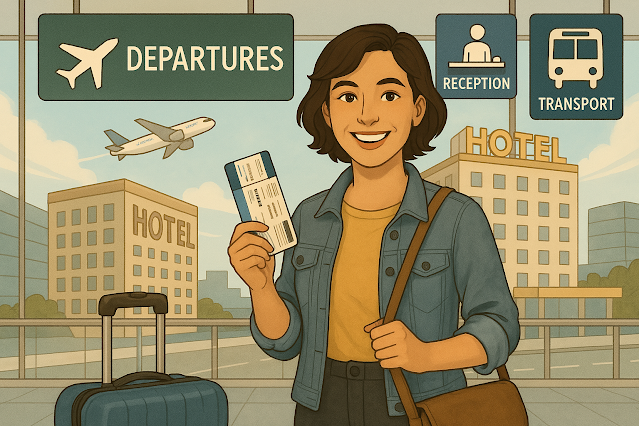Traveling is one of the best ways to use English in real life. Whether you’re at the airport, checking into a hotel, or exploring a new city, having the right vocabulary can make your trip smoother and more enjoyable. In this guide, we’ll go through essential English words and phrases used in common travel situations — with simple definitions and practical examples to help you remember them easily.
✈️ 1. At the Airport
Essential Vocabulary:
-
Check-in counter – where you show your ticket and drop off luggage
“I went to the check-in counter to get my boarding pass.” -
Boarding pass – the ticket that lets you on the plane
“Don’t forget your boarding pass before you go through security.” -
Security check – where your bags and body are checked for safety
“I had to take off my shoes at the security check.” -
Departure gate – the place where you wait to board the plane
“Our departure gate is B12.” -
Customs – the place you go when entering a country to declare items
“I didn’t have anything to declare at customs.”
Useful Phrases:
-
“Where is the check-in counter for [airline name]?”
-
“What time does the boarding begin?”
-
“Can I have a window seat, please?”
🏨 2. At the Hotel
Essential Vocabulary:
-
Reservation – a booking for a room
“I have a reservation under the name Lin.” -
Reception – the front desk where guests check in
“Ask the reception for a city map.” -
Room service – food or services delivered to your room
“We ordered breakfast through room service.” -
Key card – an electronic card used to open your room
“Your room key card is ready. You’re in 304.” -
Check-out – the process of leaving and paying
“Check-out is at 11 a.m.”
Useful Phrases:
-
“I’d like to check in, please.”
-
“Is breakfast included?”
-
“Can I get a wake-up call at 6 a.m.?”
🧭 3. Getting Around and Asking for Help
Essential Vocabulary:
-
Directions – instructions on how to go somewhere
“Can you give me directions to the museum?” -
Public transport – buses, trains, or subways
“The hotel is close to public transport.” -
Tourist attraction – popular places to visit
“The Eiffel Tower is a top tourist attraction.” -
Lost and found – a place where lost items are kept
“I left my bag on the bus. Is there a lost and found?”
Useful Phrases:
-
“Excuse me, how do I get to the train station?”
-
“Is this bus going downtown?”
-
“Can you recommend a good local restaurant?”
🧠 Tips for Remembering Travel Vocabulary
-
Use Flashcards: Write the word on one side and the meaning + example on the other.
-
Practice Role Play: Pretend you’re checking in at a hotel or boarding a flight.
-
Watch Travel Videos in English: Listen to how native speakers use these words in context.
-
Label Your Travel Items: Stick vocabulary notes on your suitcase, passport, or toiletries in English.
-
Use It on Your Next Trip: Nothing helps you remember better than using the words in real life.
📌 Final thoughts
Travel English doesn’t have to be hard! Focus on learning the most common vocabulary, practice using it in simple sentences, and use every opportunity to speak. This way, your next trip will be not only exciting — but confident and smooth in English too.

Comments
Post a Comment